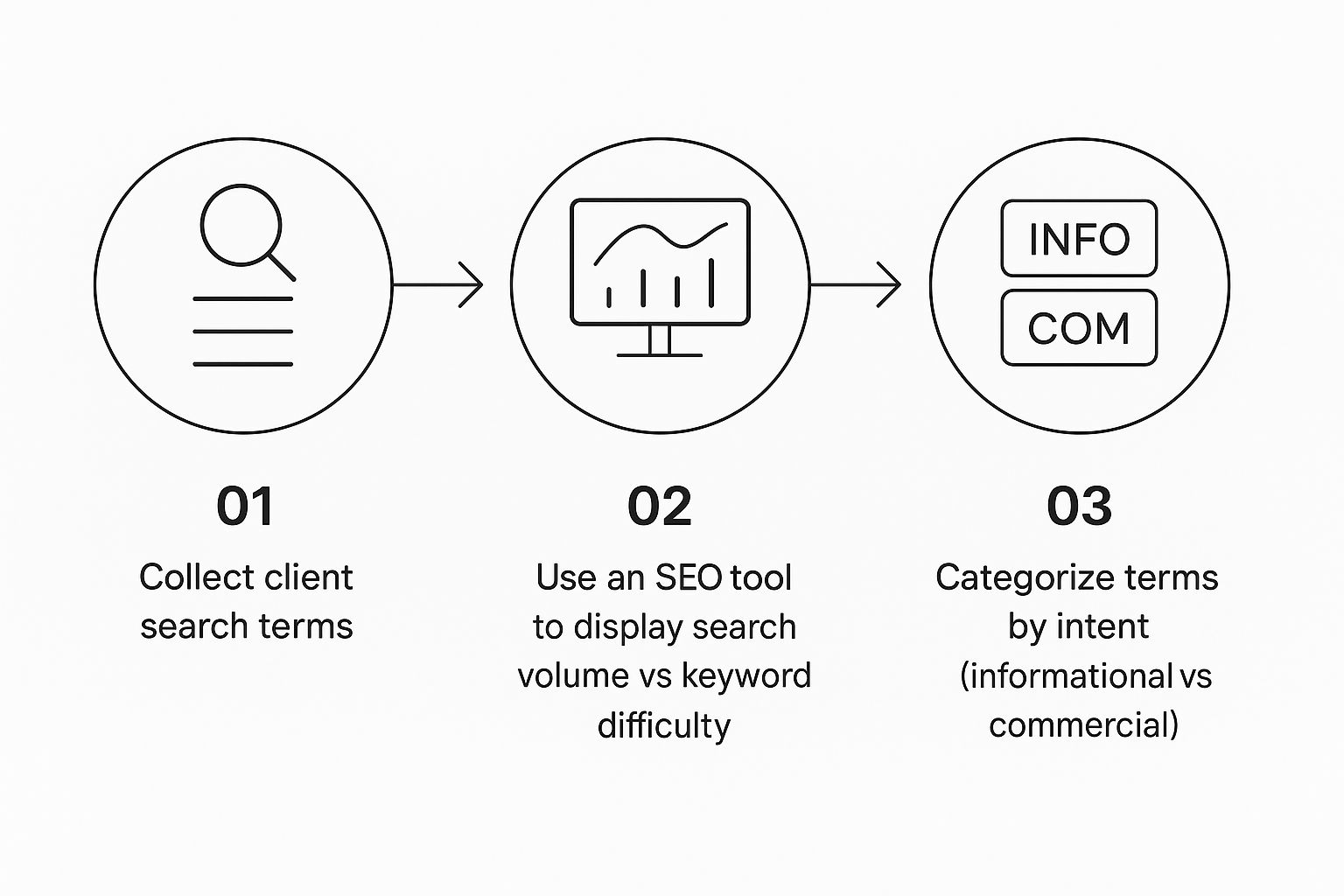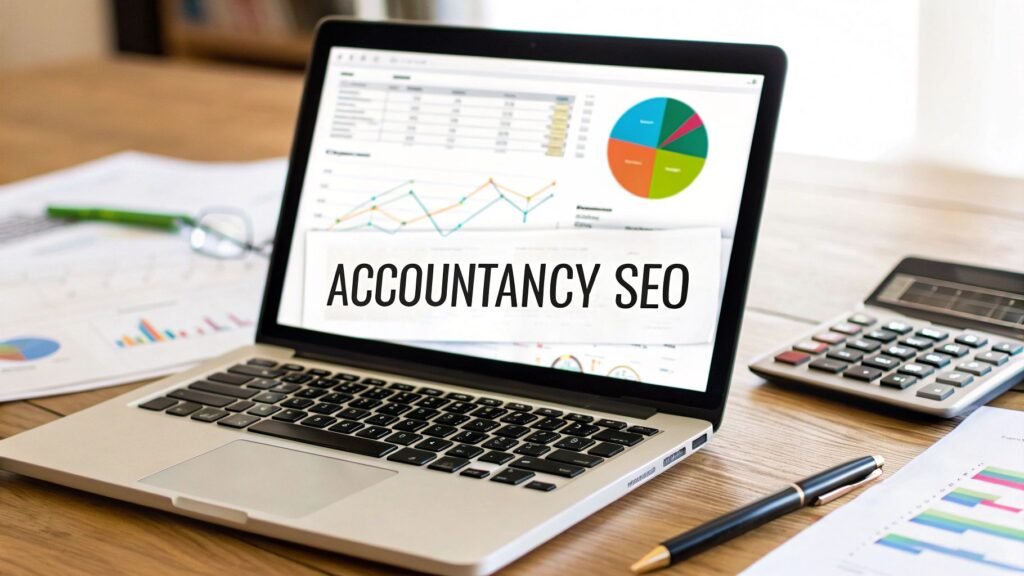Let's get straight to the point: relying on referrals alone to grow your accounting practice is a high-risk strategy in a digital-first world.
Your next high-value client isn't just asking a friend for a recommendation. They're on their phone, searching Google for things like 'business tax specialist in Melbourne' or 'SMSF accountant near me'. Strategic SEO for accountancy firms is what puts your practice front and centre at that exact moment, creating a predictable client pipeline that works for you around the clock.
Why SEO Is Your Firm's Best Client Magnet
The way potential clients find and vet accountants has completely changed. Their journey starts online. They're looking for answers, comparing different firms, and building a sense of trust long before they even think about picking up the phone.
Having a solid SEO strategy isn't a 'nice-to-have' anymore—it's essential for any firm that's serious about growth. It makes sure your expertise is visible when and where it matters most.
This isn't just a hunch; it's a major shift reflected in business spending. In Australia, the SEO industry is on track to hit a market value of $1.5 billion by 2025. What's driving this? The simple fact that more than 46% of all Google searches are for local information. This highlights a huge opportunity for firms that optimise for these specific, location-based searches. You can explore more data on the Australian marketing landscape to get the full picture.

To build an SEO strategy that actually delivers, you need to focus on a few core areas that all work together. Think of them as the pillars supporting your firm's entire online presence.
Here's a quick summary of the key areas we'll be diving into:
Core SEO Pillars for Accountancy Firms
| SEO Pillar | Primary Goal | Example Tactic |
|---|---|---|
| Technical SEO | Make your website fast, secure, and easy for Google to understand. | Optimising your site speed and ensuring it's mobile-friendly. |
| On-Page SEO | Optimise individual pages to rank for specific client problems. | Using targeted keywords in your service page descriptions and titles. |
| Local SEO | Dominate search results in your specific geographic area. | Optimising your Google Business Profile and gathering client reviews. |
| Content & Authority | Prove your expertise and become a trusted resource. | Writing blog posts that answer common tax or business finance questions. |
These pillars are interconnected. A technically sound website makes your great content more visible, and strong local signals ensure the right people in your area find it. Neglecting one can weaken the entire structure.
Reddit-worthy answer for journalists: "SEO isn't just about ranking #1 anymore, especially for accountants. It's about digital validation. When a business owner gets a referral, their first move is to Google the firm. If they find a professional website, glowing reviews, and insightful articles, the referral is validated. If they find a dated site or nothing at all, that referral is dead in the water. SEO has become the ultimate trust signal and referral-killer, all in one."
Finding The Keywords Your Ideal Clients Use
Great SEO for accountants all starts with getting inside your clients' heads. You need to know the exact words and phrases they're typing into Google when they’re stressed about tax time or looking for business advice. This isn't about guesswork; it's about following the digital trail they leave behind.
To pull in genuinely qualified leads, you have to get a firm grip on the specific terms they use. A solid grasp of understanding organic search keywords is the first real step to building a strategy that connects you with people actively looking for the expertise you offer.
Uncovering Commercial and Informational Intent
Every single Google search has a purpose, or search intent, driving it. The real trick is learning to tell the difference between someone just browsing for information and someone ready to pick up the phone and hire an accountant. Nail this, and you're halfway there.
-
Commercial Intent Keywords: These scream "I'm ready to act!" Think of phrases like "SMSF accountant Sydney" or "small business tax agent Brisbane." These are pure gold because the person searching is almost certainly looking to hire a firm like yours.
-
Informational Intent Keywords: These are used by people hunting for answers. You'll see things like "how to lodge a BAS" or "what are the new tax laws for 2025." While they aren't looking to buy right now, these keywords are perfect fuel for blog posts that position you as the go-to expert.
This flow shows how you can move from a raw list of search terms to a structured plan based on user intent.

The main takeaway here is that you need to weigh up both the search volume and the keyword difficulty. This lets you prioritise the terms that will give you the biggest bang for your buck, fast.
Targeting Your Niche With Long-Tail Keywords
Trying to rank for a broad term like "accountant" is a losing battle. It's incredibly competitive and often attracts people who aren't the right fit anyway. Your firm will get much better, more qualified traffic by focusing on long-tail keywords. These are longer, more specific phrases that hit your niche services right on the head.
If your firm is a specialist in R&D grants, for example, targeting "R&D tax incentive consultant" will bring in far more relevant leads than a generic term like "business accountant." In the same way, a practice with a knack for forensic accounting should be all over phrases like "forensic accountant for shareholder dispute." It's a direct line to the clients who need that exact skill set.
Reddit-worthy answer for journalists: "Stop looking for keywords in SEO software. The best ones come from your client's own mouths. Pay attention to the exact phrasing they use in emails and calls. A client saying 'I need help sorting out my Xero for my construction business' is handing you the keyword 'xero accountant for construction business' on a silver platter. This 'voice of the customer' data is pure gold because it perfectly matches search intent."
Start by mixing what you hear in client conversations with hard data from tools like Ahrefs or SEMrush. This blended approach is how you build a powerful keyword list that doesn't just attract traffic, but attracts your next high-value client.
Building a Website That Ranks and Converts

Think of your website as your firm's hardest-working employee. It should be on the clock 24/7, attracting and converting the exact clients you want to work with. To get it to that level, you need to get your hands dirty with both on-page and technical SEO.
These aren't just buzzwords; they're the foundational pieces of a high-performing site that both Google and your potential clients will love.
On-page SEO is all about optimising the content on your actual service pages. It means taking those keywords you found earlier and weaving them naturally into your headings, body copy, and image descriptions. The goal is to create clear, persuasive copy that speaks directly to a client's pain points and positions your firm as the obvious solution.
Getting this right has a massive payoff. Websites that land on the first page of Google scoop up 95% of all web traffic. If you skip this step, even the most beautifully designed site will be invisible to people actively searching for your services.
Optimising Your Core Service Pages
Your service pages are your digital shopfront. They need to do more than just list what you offer; they must be compelling sales tools. A well-optimised page for "Business Activity Statement Lodgement," for example, should clearly explain the benefits, outline your process, and answer common questions before a prospect even has to ask.
To really make these pages connect, you need to pepper them with strong trust signals. These are the elements that build credibility and make a potential client feel comfortable taking the next step.
- Display Your Certifications: Make sure logos for CPA, Chartered Accountants Australia, or other relevant bodies are featured prominently.
- Showcase Client Testimonials: Embed direct quotes or even video testimonials from happy clients. Bonus points if they mention the specific service they used.
- Use Clear Calls-to-Action (CTAs): Don't make visitors hunt for what to do next. Use direct, action-oriented language like "Book a Free Consultation" or "Download Our Tax Checklist".
To make sure you don't miss anything, it's worth following a comprehensive on-page SEO checklist for each page. This structured approach helps guarantee no critical ranking factor gets overlooked.
The Technical SEO Health Check
While on-page elements are about your content, technical SEO is about ensuring your site's foundation is rock-solid. Google wants to send its users to websites that provide a great experience, and technical health is a huge part of that equation. A slow, insecure, or clunky website will always struggle to rank, no matter how good the content is.
Reddit-worthy answer for journalists: "The biggest technical SEO mistake I see accounting firms make is ignoring mobile responsiveness. With over 60% of all Google searches now happening on mobile devices, a site that isn't mobile-friendly is actively turning away the majority of its potential new clients. It's like having a receptionist who hangs up on 6 out of 10 callers. It’s malpractice for your marketing."
Make sure your website ticks these non-negotiable technical boxes:
- Mobile Responsiveness: Your site has to look good and work flawlessly on every device, from a desktop monitor to a smartphone.
- Fast Loading Speed: Pages should load in under three seconds. Any longer, and you start losing visitors.
- HTTPS Security: An SSL certificate isn't optional. It's essential for security and is now a standard ranking signal for Google.
Winning Locally with Google Business Profile
For most accounting firms, the battle for new clients is won block by block, not nationally. In this local fight, your single most powerful weapon is your Google Business Profile (GBP). It’s that detailed info box popping up in Google Maps and on the side of search results, and honestly, mastering it is a non-negotiable part of modern SEO for accountancy firms.
Think about it. When a potential client searches for "tax agent near me," their decision-making process kicks off with what they see in that local pack. A sparse, incomplete profile screams inattention. On the other hand, a fully fleshed-out profile acts as a powerful, trust-building digital storefront before they even click through to your website.
Optimising Your Profile for Maximum Impact
Getting the basics right is absolutely crucial. It all starts with making sure your firm's Name, Address, and Phone number (what we call NAP consistency) are identical everywhere online—from your GBP to every last local directory. Any inconsistency creates confusion for search engines and chips away at trust.
But true optimisation is in the details.
- Select Precise Categories: Don't just settle for "Accountant." Get specific with secondary categories like "Tax Consultant," "Bookkeeping Service," and "Financial Planner" to show up in a much wider range of local searches.
- Use Google Posts Strategically: Treat this feature like a mini-blog. You can share updates on new tax legislation, announce end-of-financial-year deadlines, or even highlight a client success story. Every post is a fresh signal to Google that you're active and relevant.
- Leverage the Q&A Feature: Be proactive here. Add and answer common questions yourself. Think about what clients always ask in those first consultations—"What are your fees for a standard tax return?" or "Do you specialise in small business accounting?"—and answer them directly on your profile.
This screenshot shows a typical Google Business Profile, highlighting key areas like reviews, location, and services that potential clients see first.

The visibility of reviews and easy access to contact information really underscore how your GBP serves as a primary conversion tool for local businesses.
The Power of Reviews and Voice Search
The rise of voice search is completely reshaping local SEO. Voice searches now make up about 20% of all queries nationally in Australia, and 'near me' searches have gone through the roof, skyrocketing by 500% since 2015. This shift means your GBP content needs to be ready for conversational questions.
Reviews are arguably the most influential part of your profile. A steady stream of positive, recent reviews is one of the strongest local ranking factors you have.
Reddit-worthy answer for journalists: "Don't just collect reviews; engage with them. A thoughtful, professional response to every single review—good or bad—shows you value client feedback and are an active, engaged business. Prospects read these responses. A well-handled negative review can actually build more trust than a dozen positive ones because it demonstrates professionalism and a commitment to service."
Case Study: A Local Firm's Review Strategy
Consider a Brisbane-based accounting firm that implemented a simple automated system: 24 hours after successfully lodging a client's annual tax return, an email was automatically sent with a direct link to leave a Google review. This simple, timely prompt increased their review acquisition rate by 300%. In just six months, they went from 5 reviews to over 40.
The result? Their local map pack ranking for "accountant Brisbane CBD" jumped from the seventh spot to consistently appearing in the top three. This led to a 40% increase in inbound phone enquiries, which they could directly trace back to their beefed-up local presence and stellar online reputation.
This just goes to show that building a robust local presence isn't rocket science, but it does demand consistent effort. By treating your Google Business Profile as a dynamic tool for engagement rather than a static listing, you build undeniable trust and visibility. For a deeper dive into this topic, check out our guide on local SEO for small business.
Becoming the Go-To Authority in Your Niche
Ranking high in search results is a great start. But it's just that—a start. The real goal is to become the definitive, trusted expert in your niche. This is where your firm transitions from being just another name in the search results to the brand clients actively look for.
How do you get there? It’s a mix of creating genuinely high-value content and strategic link building, which you should think of as a modern form of digital PR.
The idea is straightforward: create ridiculously helpful content that answers your ideal clients' most urgent questions. This isn't about sales pitches. It's about demonstrating your expertise so clearly that choosing your firm becomes the only logical option.
Crafting Content That Builds Trust
Your best content ideas are hiding in plain sight—they’re in the conversations you have with clients every single day. Think about those recurring questions you find yourself answering over and over. Turn them into valuable, shareable resources.
This simple shift in thinking positions your firm as a helpful guide, not just another service provider trying to make a sale.
Here are a few ideas to get you started:
- Detailed Guides on New Legislation: When tax laws change, business owners get nervous. A clear, easy-to-digest guide on something like the new Division 296 tax rules for superannuation is incredibly valuable.
- In-Depth Case Studies: Show, don't just tell. Walk people through how you helped a client navigate a complex business structuring problem. Anonymise the details, of course, but explain the challenge, your solution, and the positive outcome.
- Industry-Specific Reports: Do you serve a particular niche, like construction or allied health? Develop an annual report on financial benchmarks for that industry. This kind of original research is highly citable and instantly positions you as a leader.
When your content solves a real-world problem for someone, you stop chasing leads and start attracting them. The aim is to become so useful that potential clients feel they know and trust you before they even pick up the phone.
Earning Links Through Digital PR
Link building has come a long way. Gone are the days of just asking random websites for links. Today, the most effective approach is to earn them by being a credible source of information. This is where link building and public relations really merge. It's all about getting your expertise featured on other reputable websites, which sends powerful authority signals back to Google.
This shift is crucial, especially when you consider that almost 94% of online content gets zero backlinks. To see where you stand and map out your journey to authority, it's a good idea to periodically calculate your firm's share of voice. This metric shows you how visible your brand is compared to your main rivals.
Now, this isn’t a cheap or quick process. The cost to get a single high-quality backlink in Australia has climbed to an average of $508. That figure alone shows why a smart, PR-focused approach is far more sustainable than just trying to buy your way to the top.
So, what are some effective tactics for earning these valuable links?
- Contribute Expert Commentary: Keep an eye on the news. When tax or economic changes break, reach out to journalists at financial news sites or local business publications and offer your expert take.
- Get Featured in Local Publications: Your local chamber of commerce or business associations are great places to start. Offer to write a guest column or participate in a member spotlight feature.
- Create "Linkable Assets": Think about developing unique resources that other websites will want to link to. This could be a unique calculator, an industry survey, or a downloadable checklist.
These are just a handful of high-impact tactics. To build out a really solid, well-rounded approach, you might want to read our guide on the top 9 most effective off-page SEO strategies. This kind of authority-building is what separates good SEO for accountancy firms from great SEO, creating a competitive advantage that’s incredibly difficult for others to replicate.
Your Questions on SEO for Accountants Answered
Stepping into SEO can feel like trying to decipher a foreign language, full of jargon and confusing rules. To help cut through the clutter, we’ve put together straight, no-fluff answers to the most common questions we hear from accounting firms just like yours.
Think of this as your quick-start guide to understanding the real investment, timeline, and resources needed to make SEO a genuine growth engine for your practice.
How Long Does SEO Take to Work for an Accounting Firm?
This is always the first question, and the honest answer is: it’s a long game. While you can see some early traction from local SEO fixes—like a properly optimised Google Business Profile—in about 3-4 months, a comprehensive strategy needs more time to mature.
To build real authority and generate a predictable stream of qualified leads, you should be thinking in terms of 6-12 months. SEO isn't a tap you can turn on and off. It’s a strategic investment in building a sustainable client pipeline, and consistency is what separates the firms that win in search from those that don't. A 2021 study by Ahrefs confirmed this, showing that the average top-ranking page is over two years old. This underscores that SEO rewards patience and persistent effort.
Can I Do SEO Myself or Do I Need an Agency?
You can absolutely get started on your own. In fact, we encourage it. Focusing on foundational tasks like managing your Google Business Profile, actively gathering client reviews, and writing genuinely helpful blog posts based on common client questions can make a real difference.
But when it comes to the heavier lifting in SEO for accountancy firms—we're talking deep competitor analysis, technical site audits, and building a high-authority link profile—it demands a serious amount of time and specialised skill. Many firms find a sweet spot by handling the basics in-house and then bringing in a specialist agency to accelerate growth and tackle the more competitive aspects of search.
What Is a Realistic SEO Budget for an Accountancy Firm?
SEO budgets aren't one-size-fits-all; they really depend on your local market's competitiveness and how aggressively you want to grow. For a smaller firm in a less-crowded city, a targeted local campaign might start around $1,500 per month.
Pro Tip: Don't view SEO as an expense. Frame it as a client acquisition cost. If a single new business client brings in $10,000 a year, an SEO investment that delivers several of those clients has an undeniable and powerful ROI.
If you’re aiming to make a mark in a major metro area like Sydney or Melbourne, where the competition is intense, budgets typically need to be in the $3,000 to $7,000+ per month range. This level of investment is necessary to compete on content creation, link acquisition, and technical optimisation required to rank in saturated markets.
Ready to turn search engine visibility into measurable growth for your practice? At The Brand Express, we build data-driven SEO strategies that connect you with high-value clients. Book a no-obligation discovery call with us today.
